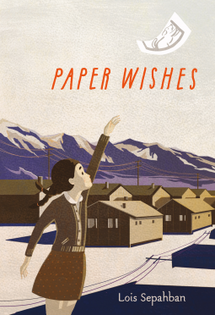Featuring:
Kathleen Rushall, Kidlit Agent Extraordinaire

Lois submitted to me via my email so the manuscript came through in my regular queries folder. It was not a referral and we had never met before. I think it’s good for everyone to remember that you really don’t have to know someone or have an ‘in’ to become published. There is magic in the inbox. It’s one of my favorite parts of this job; never knowing what will arrive in my email each day.
When you began reading PAPER WISHES, what was it about the story and the writing that kept you turning pages?
PAPER WISHES immediately grabbed me. I remember reading the first page and setting it down to return to Lois’ query letter. I wanted to double check that it was for a middle grade novel. The first few lines were so sparse and lovely; it almost felt like it could be a picture book (where every word matters). Additionally, the earliest version of the manuscript didn’t use punctuation in the standard way. It was so unusual but obviously intentional and intriguing. Manami, the main character, sounded like an old soul. From the first few lines I thought Manami’s voice was accessible for her age but held a wisdom and timelessness that resonated with me right away. For nostalgia’s sake, I just searched my Outlook and found my original reply to Lois’ pitch letter: “I just read the sample pages and am anxious about Manami and Yuijin already.”
I was completely hooked by those first pages and finished it in one sitting after Lois sent me the full manuscript. I remember walking my dogs that evening with my now husband and talking about the book the entire time. (Kevin learned a lot about Japanese internment camps and what I love in a middle grade voice, hah.) I had a strong reaction; that gut feeling that agents have when we KNOW we have to offer representation to an author and can’t wait to make the call.
Now, for as much as I knew I loved this book, I also knew it would not be an ‘easy’ or simple sell. It was an unusual format with unique, literary structure, and much shorter than a standard middle grade (it has since been further lengthened), a completely unique reading experience. As an agent, it’s my job to think how to place a book in the current market. Whenever I start to fall in love with a manuscript I begin thinking of comp titles and start strategizing how I would share this with editors. Well, I couldn’t think of comp titles that would fully capture this one. I also knew that it would take just the right editor to do this manuscript justice—someone who loved it as much as Lois and I did. Someone with the right vision. I feel this book really met its mate with Margaret. Together, Lois and Margaret truly made this shine.
In your opinion, how did Lois infuse history into her narrative without bogging Manami's story down?
The historical details in PAPER WISHES are shown through the characters’ eyes. The characters come first, and I think that’s really the key to any historical fiction. Any details we learn about Manami’s time period are shown as they affect her. Nothing is told to the reader; it’s shown. It’s emotional and intriguing. We discover where Manami’s family is headed at the same time she does. We learn the mistakes she makes with her dog, Yuijin, after it is too late, as she does. We don’t know what she should do or how she should act in her new life at the camp. The reader learns these things alongside Manami.
How did spending time with 10-year-old Manami and experiencing her grief affect you personally?
I am not a crier but I cried when I first read PAPER WISHES. This book is very personal to me. Manami’s grief hits home because it’s so grounded. It’s based on something so seemingly simple—her love for her family’s dog and her good intentions toward him. I could easily relate to this as a huge animal lover, but also because it was clear that Manami is grappling to protect at least one small element of her life as it’s crumbling around her. Manami’s dog represents something larger. Through these varying levels of loss, Lois also paves the way for Manami to heal and for the reader to experience this with her. It’s powerful.
What theme found within PAPER WISHES do you hope will resonate with children?
Manami feels powerless in the beginning of this book. In fact, she is so struck by this feeling that she physically loses her voice. I think feeling powerless and not in control of your surroundings is something every child has felt at some point—to varying degrees. It’s so important to know that there is a light at the end of this feeling, how to come out on the other side of that experience. In addition, PAPER WISHES has themes of tolerance and compassion that resonate very strongly in today’s climate. I hope readers will connect to that as well.

PAPER WISHES is historical-fiction for middle-grade readers ages 8-12. It is written by Lois Sepahban and published by Margaret Ferguson Books an imprint of Farrar, Straus & Giroux (BYR), January, 2016. Read a starred Kirkus Review HERE.












